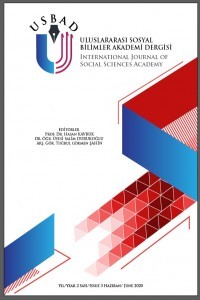CISCO DİJİTAL HAZIRLIK ENDEKSİNDE TÜRKİYE İÇİN PERSPEKTİFLER
CISCO Hazırlık Endeksi, Dijitalleşme, Dijital Dönüşüm, Türkiye
PERSPECTIVES IN THE CISCO DIGITAL READINESS INDEX FOR TURKEY
CISCO Readiness Index, Digitalization, Digital Transformation, Turkey,
___
- CISCO. (2019). CISCO Readiness Index 2019. Erişim Adresi: https://www.cisco.com/c/m/en_us/about/corporate-social-responsibility/research-resources/digital-readiness-index.html#/.
- DFKI. (2016). Industrie 4.0: Cyber-Physical Production Systems for Mass Customization.
- Grant, M. (2020). Startup. Erişim Adresi: https://www.investopedia.com/terms/s/startup.asp#:~:text=The%20term%20startup%20refers%20to,they%20believe%20there%20is%20demand.
- Heritage. (2020). Erişim Adresi: https://www.heritage.org/index/country/turkey.
- İnternetworld. (2020). Erişim Adresi: https://www.internetworldstats.com/stats.htm
- OECD. (2020). Gross Domestic Spending R&D. Erişim Adresi: https://data.oecd.org/rd/gross-domestic-spending-on-r-d.htm.
- OECD. (2020). Labour Force Pariticipation. Erişim Adresi: https://data.oecd.org/emp/labour-force-participation-rate.htm.
- Presidency of the Republic of Turkey Investment Office. (2020). The State of Turkish Start-up Ecosystem. https://www.invest.gov.tr/en/library/publications/lists/investpublications/the-state-of-turkish-startup-ecosystem.pdf.
- Ritzer, G. (2011). Küresel Dünya. İstanbul: Ayrıntı Yayınevi.
- Statista. (2020). Global Digital Population as of July 2020. https://www.statista.com/statistics/617136/digital-population-worldwide/ .
- Tapscott, D. (1998). Dijital Ekonomi. İstanbul: KoçSistem Yayınları.
- The World Bank. (2020). Doing Business. Erişim Adresi: https://www.doingbusiness.org/en/reports/global-reports/doing-business-2020.
- Tiryakioğlu, M. (2014). Kalkınma İçin Teknoloji-Türkiye'de Teknoloji Transferi Politikaları. Erişim Adresi: http://file.setav.org/Files/Pdf/20140911181541_turkiye%E2%80%99de-teknoloji-transferi-politikalari-pdf.pdf.
- TUİK. (2020). Erişim Adresi: http://www.tuik.gov.tr/
- UNDP. (2020). Expected Years of Schooling (Years). Erişim Adresi: http://hdr.undp.org/en/indicators/69706#
- World Justice Project. (2019). Rule of Law Index. Erişim Adresi: https://worldjusticeproject.org/sites/default/files/documents/ROLI-2019-Reduced.pdf .
- Worldbank. (2018). Logistic Performance Index. Erişim Adresi: https://lpi.worldbank.org/international/global/2018.%202019 .
- Worldbank. (2019). Time Required to get Electricity. Erişim Adresi: https://data.worldbank.org/indicator/IC.ELC.TIME?locations=TR
- Worldbank. (2020). New business density-Turkey. Erişim Adresi: https://data.worldbank.org/indicator/IC.BUS.NDNS.ZS?locations=TR Erişim Tarihi: 18.10.2020,
- Worldbank. (2020). Human Capital Project. Erişim Adresi: https://www.worldbank.org/en/publication/human-capital Erişim Tarihi: 12.10.2020,
- WWF. (2020). Tatlı Su. Erişim Adresi: https://www.wwf.org.tr/calismalarimiz/tatli_su/,Erişim Tarihi: 12.10.2020.
- Worldbank. (2020). Erişim Adresi: https://data.worldbank.org/.
- Yıldırım, G. (2019). Küreselleşme ve Çok Uluslu Şirketlerin Teknoloji Transferi: Türkiye Örneği. (Yayınlanmamış Yüksek Lisans Tezi). Marmara Üniversitesi, Sosyal Bilimler Enstitüsü, İktisat Ana Bilim Dalı. İstanbul.
- Başlangıç: 2019
- Yayıncı: Salim DURUKOĞLU
LİDERLİK DAVRANIŞI VE ÇALIŞAN PERFORMANSI İLİŞKİSİ
GPT3: DALL-E VE JL2P EKSENİNDE VERİ GÖRSELLEŞTİRME VE HAREKETLENDİRME ÜZERİNE BİR İNCELEME
ARAP BAHARI ÖNCESİ VE SONRASINA YÖNELİK TÜRK DIŞ POLİTİKASI: TUNUS, MISIR, BAHREYN VE YEMEN ÖRNEĞİ
İZMİR METRO SİSTEMİ’NİN ÇEVRESİNDE MEYDANA GELEN DEMOGRAFİK VE MEKÂNSAL ETKİLERİN İNCELENMESİ
Gülsüm Ecem DEMİRDAĞ, İrem AYHAN SELÇUK
“TÜRK DÜNYASININ NAĞIL BAĞI MASAL BAHÇESİ”NDE SU KÜLTÜ
ENGİNAR (CYNARA SCOLYMUS): BESİN DEĞERİ VE OLASI SAĞLIK ETKİLERİ
"ABAY YOLU" DESTANSI ROMANININ YABANCI DİLE ÇEVİRİSİNİN DİLBİLİMSEL ANALİZİ
Moldir SHOİMANOVA, Gülgül KANSEİTOVA, Zhumagul KANSEİTOVA
KİTAP iNCELEMESİ: ORTA HALLİ OSMANLILAR
KAFKAS ÜNİVERSİTESİ ÖĞRENCİLERİNİN AVRUPA BİRLİĞİ ALGISI
Haydar EFE, Funda KEMAHLI GARİPOĞLU, Murat KIZIL, Duygu BİBAR
